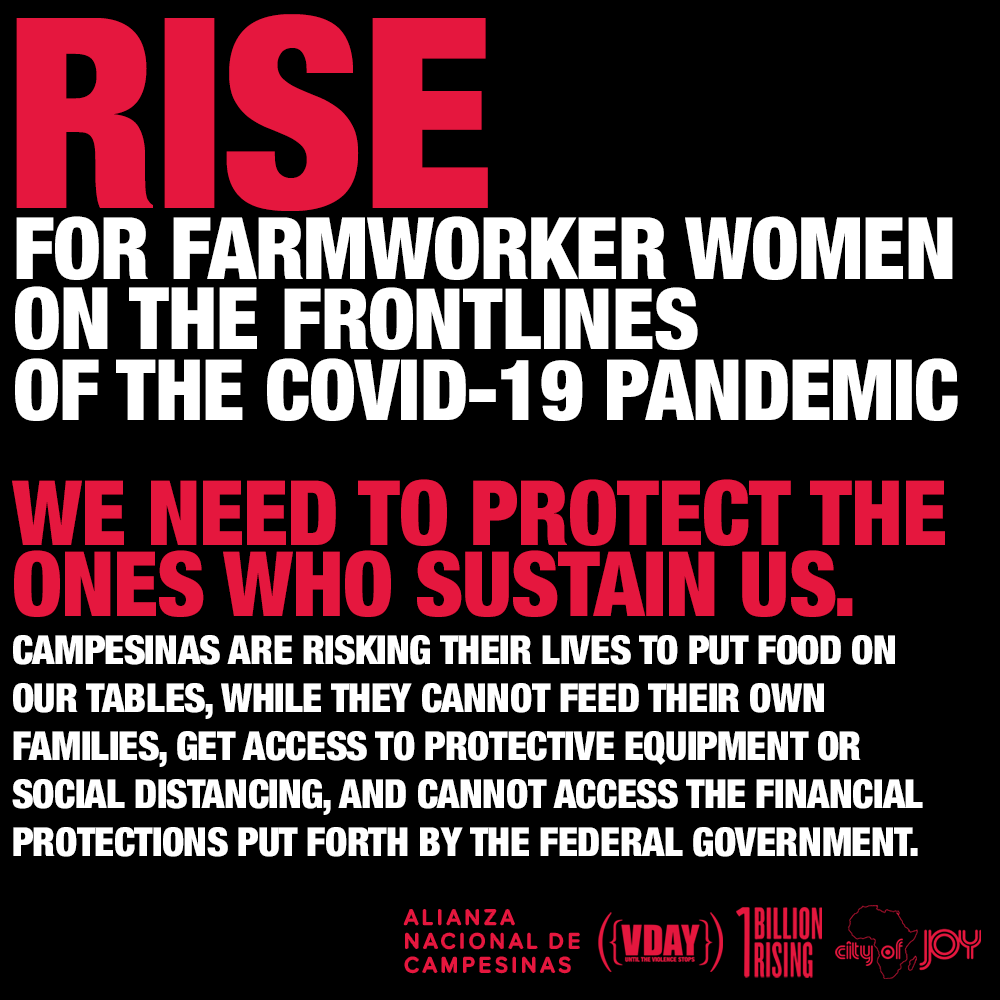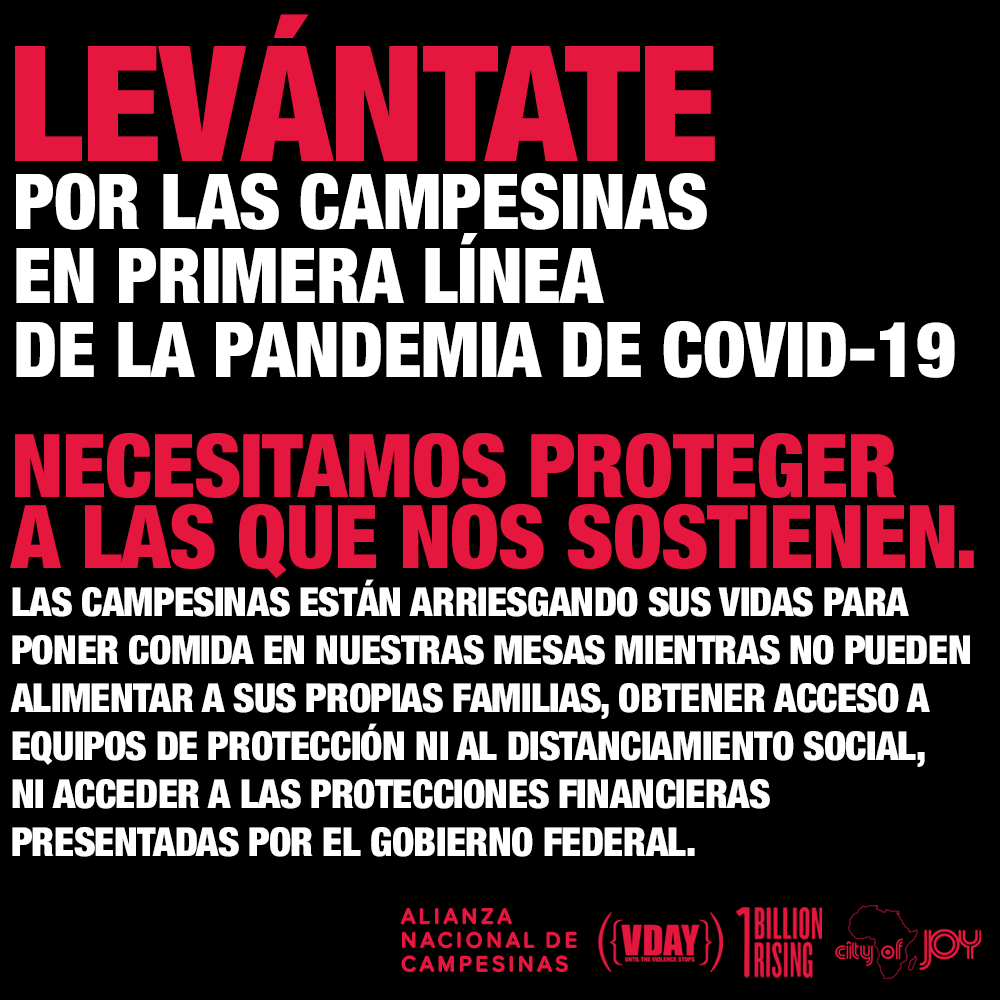
04 Apr Rise for Farmworker Women on the Frontlines of the Covid-19 Pandemic
We need to protect the ones who sustain us. Campesinas are risking their lives to put food on our tables while they struggle to feed their own families, lack access to protective equipment and are unable to practice social distancing. The vast majority cannot access financial protections put forth by the federal government.
“…the work does not stop. We were told that we have to continue working. They gave us a letter that says that we are essential workers. One fear we have is that we don’t have a driver’s license. They told us that if we have the letter, at the moment that we get stopped by the police and get asked for our license, well we travel in fear of being out in the street. We all need your help and especially those who have small children who have to leave them at home in order to work. We hope we get some help. We hope there will be help for all.” – Ruzelia, Farmworker
RISE IN SOLIDARITY WITH FARMWORKERS
THE ESSENTIAL WORKERS PUTTING FOOD ON OUR TABLES IN THE FACE OF COVID-19
The rapid spread of Coronavirus across the globe has revealed what has always been a glaring truth for so many of the essential workers who are the backbone of our society: inequity. From the people who pick our food to the people who deliver our packages, it is the working class and poor who are most vulnerable to the virus and the economic disaster that Covid-19 has laid bare.
V-Day and One Billion Rising have partnered with Alianza Nacional de Campesinas / National Farmworkers Women’s Alliance for many years on our intersectional work to end violence against all women and girls, and our Women Workers Rising initiatives.
Let us RISE in support of Alianza and farmworkers as they face unprecedented risks in the face of the Covid-19 pandemic.
“There is no standard for safety orientation. Sometimes we’re hearing they just get a five-minute talk – stay six feet apart, don’t do this, don’t do that – but we are still working in big crowds. It feels like it’s not being taken seriously because the money is more important.” – Irene De B, Farmworker
The daily life of a farmworker is tough on any given day but in the context of the Corona virus it is even harder. According to The Guardian, in California, the state’s 400,000 plus farmworkers are exempt from shelter in place measures and do not have the option of working from home. If they stay home for fear of being infected they risk losing their jobs.
The days are long. Early mornings and full days mean that by the time a farmworker is off shift and gets to the store the shelves are empty. Many are living on the edge of hunger. And working conditions do not allow for social distancing which has shown to be an effective defense against the virus. Many farmworkers travel to and from work in packed vans and live in crowded housing; social distancing is a luxury they cannot afford. And while these essential workers are picking the nation’s food, they are without access to soap and water and protective masks and gloves. In addition, if they fall sick, they do not have access to benefits like paid sick leave to stay home.
For farmworkers – many of whom are women – the choice is between earning their daily wage and being without shelter and food for their families. The Trump administration’s inhumane immigration policies further heighten these hardships – when undocumented farm workers fall sick, many are fearful to seek out testing and health support because they do not want to be detained. Without testing and care, their own health and that of other farmworkers is put at risk.
With women and their families, the situation is dire – they are often forced to leave their young children home in the care of older siblings because the schools are closed. This situation, as well as the fact that domestic violence and rape crisis providers are having to revise services because of the pandemic, means that farmworker women are ever more vulnerable to violence and abuse.
Rise for Farmworker Women on the Frontlines
Of the Covid-19 Pandemic
We need to protect the ones who sustain us.
JOIN US! Take Action:
SPREAD the Word across your networks: Make the connection between the food on your table and the workers who made it possible.
SAMPLE SOCIAL MEDIA COPY: RISE FOR FARMWORKER WOMEN ON THE FRONTLINES OF THE COVID-19 PANDEMIC!
We need to protect the ones who sustain us. Campesinas are risking their lives to put food on our tables while they struggle to feed their own families, lack access to protective equipment and are unable to practice social distancing. The vast majority cannot access financial protections put forth by the federal government. The rapid spread of #Coronavirus across the globe has revealed what has always been a glaring truth for so many of the essential workers who are the backbone of our society: inequity. From the people who pick our food to the people who deliver our packages, it is the working class and poor who are most vulnerable to the virus and the economic disaster that #Covid19 has laid bare.
#VDay and #1BillionRising have partnered with #AlianzaNacionalDeCampesinas / #NationalFarmworkersWomensAlliance for many years on our intersectional work to end violence against all women and girls, and our #WomenWorkersRising initiatives. Let us RISE in support of Alianza and farmworkers as they face unprecedented risks in the face of the Covid-19 pandemic.
RISE IN SOLIDARITY WITH FARMWORKERS, THE ESSENTIAL WORKERS PUTTING FOOD ON OUR TABLES IN THE FACE OF COVID-19! For our full statement (in English & Spanish) & info on how you can help, visit: onebillionrising.org/riseforfarmworkerwomen
#RiseForFarmworkerWomen #RiseForCampesinas #CampesinasRising #RiseResistUnite #RiseInSolidarity #UntilTheViolenceStops @campesinasunite @one_billion_rising @vdayorg @eveensler
SUPPORT Farmworker Women, Support Alianza’s work: As they work jointly with their member organizations and other farmworker advocacy groups to address these specific challenges and needs that farmworkers and their families are experiencing they are also making preparations should people be laid off and not have money to buy food, get medical attention, pay their rent, or if they lose their homes and need shelter. Advocatefor safe living conditions and working conditions, with access to safe drinking water, soap and water to wash and sanitize their hands, and protective materials such as gloves or masks.
EDUCATE policy makers about the specific needs and challenges of farmworker families and communities and that whatever benefits are being made available through legislative packages reach these vulnerable workers and communities, including:
- Free COVID-19 testing, treatment and emergency care.
- Paid sick leave and access to unemployment benefits.
- Critical housing and rent assistance and access to life-saving food and nutrition programs.
- Access to receive the economic relief and assistance made available by COVID-19 related legislation packages.
- An immediate moratorium on all deportations, immigration arrests, mass raids, and detentions.
- Ensuring that immigrant survivors of sexual assault and intimate partner violence and their families have access to the help and services they need.
Find your Representatives at https://www.house.gov/representatives/find-your-representative
Find your Senator at https://www.senate.gov/general/contact_information/senators_cfm.cfm
GET INFORMED, READ Alianza’s statement: https://www.alianzanacionaldecampesinas.org/news

“… el trabajo no se detiene. Nos dijeron que tenemos que seguir trabajando. Nos dieron una carta que dice que somos trabajadores esenciales. Un miedo que tenemos es que no tenemos licencia de conducir. Nos dijeron que enseñemos la carta si nos detiene la policía y nos piden la licencia de conducir, pero viajamos con miedo de estar en la calle. Todos necesitamos vuestra ayuda y especialmente los que tienen niños pequeños y se ven obligados a dejarlos en casa para poder trabajar. Esperamos obtener ayuda. Esperamos que haya ayuda para todos.” – Ruzelia, Trabajadora Agrícola
LEVÁNTATE EN SOLIDARIDAD CON LAS TRABAJADORAS AGRÍCOLAS
LOS TRABAJADORES ESENCIALES QUE ASEGURAN QUE HAYA COMIDA EN NUESTRAS CASAS FRENTE AL COVID-19
La rápida propagación del coronavirus por el mundo ha revelado lo que siempre ha sido una realidad oscura y deslumbrante para muchos de los campesinos que son trabajadores esenciales y el espinazo de nuestra sociedad: la inequidad. La clase trabajadora y gente viviendo en pobreza – desde los que cosechan nuestra comida hasta los que entregan nuestros paquetes – son los más vulnerables al virus y al desastre económico que COVID-19 ha dejado al descubierto.
V-Day y One Billion Rising se han asociado con Alianza Nacional de Campesinas durante muchos años con respecto a nuestro trabajo interseccional de poner fin a la violencia contra todas las mujeres y niñas, y con nuestras iniciativas de Mujeres Trabajadoras, “Women Workers Rising”.
LEVANTÉMONOS en apoyo de la Alianza y de los trabajadores agrícolas quienes se enfrentan a riesgos sin precedentes frente a la pandemia de Covid-19.
“No hay un estándar para la orientación de seguridad. Nos dicen que a veces les dan tan solo una charla de apenas cinco minutos – mantente a seis pies de distancia, no hagas esto, no hagas eso – pero todavía trabajamos en grandes multitudes. Nos parece que no se lo están tomando en serio porque el dinero les es más importante.” – Irene De B, Trabajadora Agrícola
La vida diaria de un trabajador agrícola es difícil en un día cualquiera, pero en el contexto del coronavirus es aún más difícil. Según el diario “The Guardian”, en California, los más de 400,000 trabajadores agrícolas del estado están exentos de medidas de “refugio en lugar” y no tienen la opción de trabajar desde casa. Si se quedan en casa por temor a ser infectados, corren el riesgo de perder sus trabajos.
Los días son largos. El tener que madrugar y trabajar días completos significa que cuando un trabajador agrícola está fuera de turno y llega a la tienda, los estantes están vacíos. Muchos viven al borde del hambre. Y las condiciones de trabajo no permiten el distanciamiento social, que ha demostrado ser una defensa efectiva contra el virus. Muchos trabajadores agrícolas viajan entre sus hogares y el trabajo en camionetas llenas de gente y viven en viviendas abarrotadas; el distanciamiento social es un lujo que no se pueden permitir. Y mientras estos trabajadores esenciales están cosechando los cultivos de la nación, lo hacen sin acceso ninguno a agua, ni a jabón, ni a máscaras, ni a guantes protectores. Además, si caen enfermos, no tienen acceso a beneficios médicos como el pago por ausencia laboral debido a enfermedad que les otorgaría el derecho de quedarse en casa.
Los trabajadores agrícolas – muchos de los cuales son mujeres – se encuentran obligados a elegir entre su salario diario o quedarse sin refugio y sin comida para sus familias. Las pólizas de inmigración inhumanas de la administración de Trump aumentan aún más estas dificultades – cuando los trabajadores agrícolas indocumentados caen enfermos, muchos temen buscar pruebas médicas y apoyos de salud porque no quieren ser detenidos por las autoridades. Sin pruebas ni asistencia médica, su propia salud y la de sus compañeros se ve amenazada.
La situación es grave para las mujeres y sus familias – se ven obligados muy a menudo a dejar a sus hijos pequeños en casa al cuidado de sus hermanos mayores porque las escuelas están cerradas. Esta situación, así como el hecho de que los proveedores de violencia doméstica y los de crisis de violación están teniendo que revisar sus servicios disponibles debido a la pandemia, significa que las trabajadoras agrícolas son cada vez más vulnerables a la violencia y al abuso.
Levántate por las Trabajadoras Agrícolas en Primera Línea de la Pandemia de Covid-19
Necesitamos Proteger a las que Nos Sostienen.
¡ÚNETE A NOSOTROS! Toma acción:
CORRE LA VOZ en tus redes: Haz la conexión entre la comida que está sobre tu mesa y los trabajadores agrícolas que lo hicieron realidad.
APOYA a las trabajadoras agrícolas, apoya el trabajo de Alianza: A medida que trabajan de forma conjunta con sus organizaciones miembro y con otros grupos de defensa de trabajadores agrícolas para abordar estos desafíos específicos y estas necesidades de los trabajadores agrícolas y las de sus familias, también están haciendo preparativos en caso de despedidas que dejen a trabajadores sin dinero para comprar comida, recibir atención médica, pagar el alquiler, o por si pierden sus hogares y necesitan refugio. Velar por condiciones de vida y de trabajo seguras con acceso a agua potable, a jabón y a agua para lavarse y desinfectarse las manos, y por materiales de protección como guantes y máscaras.
EDUCAR a representantes políticos(as) sobre las necesidades específicas y los retos con los que se enfrentan las familias y comunidades campesinas, exigir que los beneficios disponibles a través de paquetes legislativos les lleguen a estos trabajadores(as) y comunidades vulnerables, y que incluyan:
- Pruebas médicas gratuitas de Covid-19, incluyendo tratamiento y atención de emergencia.
- Pago por ausencia laboral debido a enfermedad y acceso a subsidios de desempleo.
- Asistencia crítica de vivienda y alquiler y acceso imprescindible a programas de alimentación y nutrición.
- Acceso para recibir el alivio económico y la asistencia brindada por los paquetes de legislación relacionados con el Covid-19.
- Una moratoria inmediata de todas las deportaciones, los arrestos de inmigración, las redadas masivas y las detenciones.
- Una garantía que inmigrantes sobrevivientes de asalto sexual y de violencia de pareja íntima y sus familias tengan acceso a la ayuda y los servicios que necesitan.
Encuentre sus Representantes y Senadores(as): – https://www.house.gov/representatives/find-your-representative – https://www.senate.gov/general/contact_information/senators_cfm.cfm
Infórmate, lee la posición de Alianza y únete a la lucha: https://www.alianzanacionaldecampesinas.org/news



